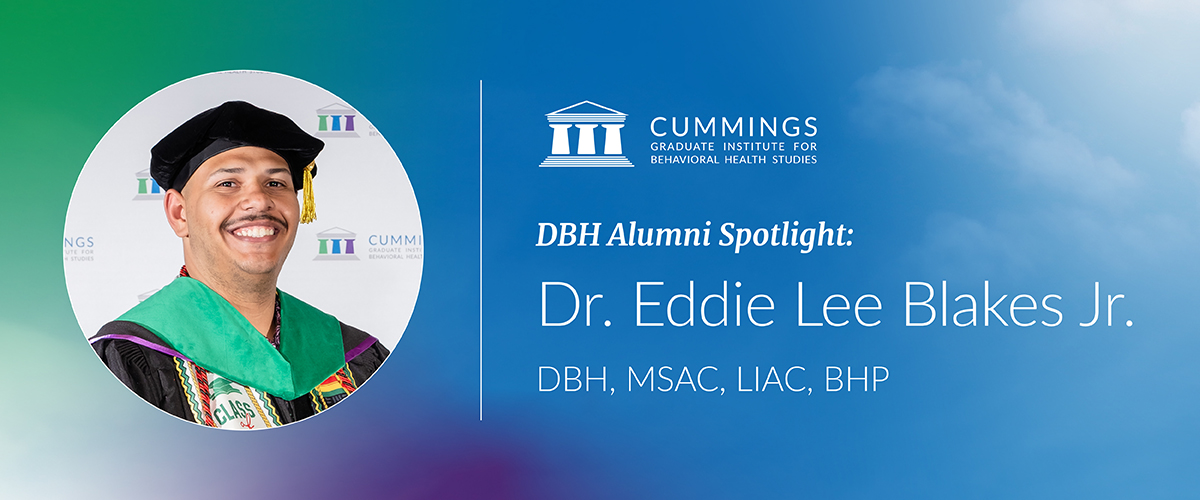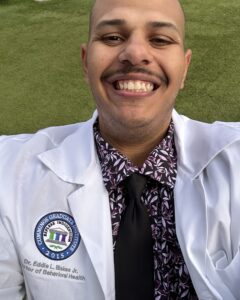 Resilience Through Resistance: Dr. Eddie Lee Blakes Jr.’s Path to Systemic Change
Resilience Through Resistance: Dr. Eddie Lee Blakes Jr.’s Path to Systemic Change
Dr. Eddie Lee Blakes Jr., DBH, MSAC, LIAC, BHP, is a dedicated behavioral health professional, social justice advocate, and founder of VR Psych Services LLC, a private practice based in Mesa, Arizona. With more than a decade of experience as a Doctor of Behavioral Health and Licensed Independent Addiction Counselor, he specializes in trauma-informed care, substance use treatment, and integrated mental health services. His clinical expertise includes individual, couples, and family therapy, as well as clinical supervision and behavioral health consulting. As a queer, Black provider, Dr. Blakes is dedicated to dismantling systemic barriers and advancing equity in care for marginalized communities, particularly BIPOC and LGBTQIA+ individuals. Through VR Psych Services, he combines traditional therapy with innovative virtual modalities to expand access and meet clients where they are, emotionally, socially, and geographically. In this interview, Dr. Blakes shares how earning his DBH became an act of resistance against systemic barriers, the innovative strategies he’s using to expand access and equity in care, and his vision for leading transformative change in the behavioral health field.
How has earning your DBH shaped your approach to behavioral health?
Earning my DBH wasn’t just about getting a degree. It was a way to push back on a broken system. For me, it was an act of resistance and reform.
I grew up with a single mother and didn’t have much access to resources. Becoming a therapist wasn’t something that people around me talked about. But I found my way into addiction counseling, and I loved helping people work through trauma, pain, and recovery. Still, I started to see that there were major problems in the system, especially here in Arizona.
In Arizona, addiction counselors like me are limited in what we’re “allowed” to do. Even though we’re trained and qualified to help with mental health issues, the state board and lawmakers often treat us like second-class professionals. That hurts not just us, but the people we’re trying to serve. These outdated rules separate addiction from mental health care and make it harder for people to get the help they need.
I got my DBH because I wanted to break out of that box. I wanted to be seen as a full healthcare leader, not just a therapist working under restrictions. The DBH gave me the tools I needed to understand healthcare systems, policy, leadership, and public health, not just clinical care.
With this degree, I was able to grow VR Psych Services into a trauma-informed, culturally focused agency. We serve people from all walks of life, especially BIPOC and LGBTQIA+ communities. I now train and supervise other clinicians and work on creating better systems for care. I don’t just work in the system, I’m changing it!
Getting this degree wasn’t just for me. It was for every addiction counselor who’s been told they’re not enough. It was for every patient who’s been bounced between providers. It was for the next generation of leaders who want to do things differently.
The DBH helped me turn my lived experience into leadership, and that changed everything.
 What innovative approaches or strategies do you believe have the potential to revolutionize the behavioral health landscape?
What innovative approaches or strategies do you believe have the potential to revolutionize the behavioral health landscape?
What innovative approaches or strategies do you believe have the potential to revolutionize the behavioral health landscape?
I believe the future of behavioral health is about more than technology, it’s about making care work for real people. That means listening to communities, being flexible, and removing barriers that keep people from getting help.
At VR Psych Services, I’ve started using virtual reality (VR) therapy to support people with trauma, anxiety, and addiction. It helps people feel more in control during treatment. But innovation isn’t just about tech, it’s about access. We offer flexible scheduling, hybrid sessions (in-person and virtual), and we meet people where they’re at, emotionally and culturally.
To me, one of the biggest innovations is recognizing that people with lived experience, especially BIPOC, LGBTQIA+, and working-class folks, belong in leadership. We need more therapists, counselors, and leaders who truly understand what it’s like to go through the system. We also need to break down the old rules that keep addiction and mental health treatment separate. It’s time to treat the whole person, not just parts of them.
We have to stop making people jump through hoops to get care. They shouldn’t need five referrals or wait months for help. That’s not innovation, that’s harm. True innovation means building systems that care for people with compassion, speed, and flexibility.
When we listen to the people we serve, center equity, and make care human again, we’ll see real change.
Looking back at your DBH journey, what specific insights or skills have you gained that have been instrumental in your professional development?
The DBH gave me the skills I needed to lead, not just in therapy, but in the bigger healthcare world.
Before the program, I had the passion and clinical training. But I didn’t always know how to turn big ideas into real programs or how to speak the language of healthcare systems. The DBH taught me how to build programs, lead teams, look at data, and think about healthcare as a whole, not just one patient at a time.
I also learned that my background matters. As a queer, Black professional who didn’t come from money or privilege, I used to wonder if there was space for me at the leadership table. The DBH helped me see that my experience is a strength, not a weakness. It gave me the confidence to bring my full self into every room.
Now, I run a practice, train and supervise new clinicians, and consult on making care more accessible. I use the skills from the DBH every day, whether I’m writing policies, meeting with providers, or helping someone through a hard time.
This degree helped me connect my values with my work. It showed me that leadership isn’t just about being in charge, it’s about creating change.
 What are your career goals in behavioral health, and how will the DBH program help you achieve them?
What are your career goals in behavioral health, and how will the DBH program help you achieve them?
My future goals are big, but they’re personal too. I want to grow VR Psych Services into a multi-state agency that offers trauma-informed, culturally respectful care for people who are often overlooked, especially Black, brown, queer, and working-class communities.
I want to keep offering therapy, but also expand into training, consulting, and public advocacy. I’ve seen too many systems that make care harder instead of easier. I want to help change that, not just in Arizona, but in other places too.
I’m also passionate about helping change outdated laws and rules that block counselors from doing the work they’re trained to do. Arizona’s system, for example, keeps addiction counselors stuck in one lane, even when we know how to treat mental health too. That needs to change, and I want to be part of that.
The DBH gave me the tools to think like a leader, speak like a policy advocate, and work across systems. It taught me how to take action, not just talk about ideas. It gave me the structure I needed to match my goals with real solutions.
Everything I want to do in the future, whether that’s building new programs, mentoring young professionals, or influencing policy, starts with what the DBH gave me: clarity, confidence, and a plan.
How do you view the role of leadership in advancing behavioral health outcomes, and in what ways has the DBH program prepared you for leadership positions?
Leadership is everything in behavioral health. We work in a field that can be heavy, complicated, and frustrating. Good leaders are the ones who keep people going, even when the system doesn’t make it easy.
Before the DBH, I was already helping people, but I didn’t always see myself as a leader. This program changed that. It showed me how to lead with empathy, how to plan programs, supervise teams, and speak up when things aren’t right.
The DBH also taught me how to look at the big picture, how to measure success, use data, and make real change in the way services are delivered. That’s the kind of leadership we need, people who care about both the people and the process.
I lead with my full self. I’m a queer, Black provider. I grew up in systems that weren’t built for me. And now I get to lead in a way that makes space for others who’ve felt the same. I build teams where people feel seen and supported. I challenge systems that create barriers instead of access.
The DBH gave me the tools to lead with confidence, strategy, and heart. And every day, I use that to make behavioral health better for the people who need it most.
What advice would you give to someone considering the DBH program?
If you’re thinking about the DBH program, that probably means you already care deeply about making changes, and that’s the best reason to start.
My advice is simple: go for it, but come in with purpose. Know what you care about, even if you’re not sure where it will take you. The DBH will give you tools, but your values and voice are what will carry you through.
This program will challenge you. It’s not easy, but it’s worth it. You’ll learn how to work within systems and how to change them. You’ll learn how to lead with facts and with heart. And if you come from a background that’s been ignored or left out, even better. This field needs your story, your experience, and your point of view.
Don’t wait for someone to give you permission to lead. Use this degree to build your own path, and then make space for others too.
The DBH helped me turn frustration into leadership. It helped me turn struggle into structure. If you want to do more than just help people, if you want to build systems that work better for everyone, this is the degree for you.
Dr. Eddie Lee Blakes Jr.’s story is one of resilience, innovation, and unwavering commitment to equity. From using his DBH as a tool of resistance against restrictive systems to applying its training in integrated care, leadership, and healthcare innovation, he has strengthened his ability to influence change at both the clinical and systemic levels. The degree has amplified his impact, expanding VR Psych Services, advancing policy reform, and deepening his advocacy for accessible, culturally responsive care. As he mentors the next generation of behavioral health leaders, Dr. Blakes proves that leadership is not just about credentials, it’s about courage, community, and creating lasting change.
Connect with Dr. Eddie Lee Blakes Jr.
- Instagram: @vr_psych_services_llc
- Website: www.vrpsychservices.com






























